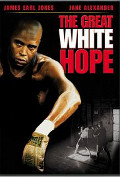
Directed by
Martin Ritt
103 minutes
Rated M
Reviewed by
Chris Thompson

The Great White Hope
Synopsis: In the early 1910’s after returning to America following a triumphant prize fight in Sydney, Australia, Jack Jefferson (James Earl Jones) seeks to seal his position by luring former champion Franklyn Brady (Larry Pennell) out of retirement. Seen by the media and the country as the ‘great white hope’, Brady is defeated and Jefferson is declared the heavyweight champion of the world. But as a black man, he's not only fighting other boxers, but racial prejudice as well. Boxing fans and press resent the idea of a black champion and continue to search for their great white hope but District Attorney Al Cameron (Hal Holbrook) and FBI Agent Dixon (Robert Webber) have another plan for bringing the champion down. On the ship back from Australia, Jefferson met and fell in love with Eleanor Bachman (Jane Alexander), a white woman. Contriving to use the Mann Act, a recent law making it a crime to transport a woman across state lines for immoral purposes), Dixon sets out to entrap Jefferson and put an end to his seemingly unstoppable boxing career.Following a five year hiatus as a McCarthy era blacklisted television writer (a period where he concentrated on theatre and teaching) Martin Ritt rebounded in the mid-‘50s to establish himself as a talented, astute and socially conscious filmmaker. With a strong slate of successful films like 1958’s The Long Hot Summer and 1963’s Hud (both featuring a young Paul Newman) he managed to have two politically charged films hit the screens in 1970: the moderately successful The Molly Maguires and this powerful examination of racial prejudice in the era immediately before the First World War.
Introduced with the caveat that only ‘much of what follows is true’, The Great White Hope loosely follows the real life of heavyweight champion Jack Johnson (aka The Galveston Giant) in Howard Sackler’s screen adaptation of his own 1968 play of the same name. Here, in their first screen appearances (Ritt seems to have a knack for casting great actors early in their careers) Jones and Alexander reprise their Tony Award winning stage roles giving electric and luminous performances that arc like a Greek tragedy. What’s most interesting about this story is that it goes beyond an obvious study of white suppression of black culture to examine the trickier issue of black prejudice against a black man succeeding in a white world. At a low point in Jefferson’s career, he winds up in Budapest playing in a hokey stage version of Uncle Tom’s Cabin. Its echoes of the way some in the black community view the privilege and largesse of his lifestyle and his interracial marriage are obvious without being didactic. But for Jefferson, this is not a racial crusade. He just wants to be the best fighter he can and live a good life with the woman he loves.
Sackler’s screenplay crackles with great dialogue from deftly-drawn characters and to his and Ritt’s credit, the film never feels like a stage adaptation. Perhaps its fight scenes lack the visceral nature of some of the great black-and-white fight films of the ‘40s and ‘50s (think Robert Wise’s The Set-Up,1949, and to a lesser extent Somebody Up There Likes Me,1956, and Robert Rossen’s Body and Soul,1947) but what it lacks in pugilistic realism it more than makes up for in the punch its story packs.

Want more about this film?


Want something different?




